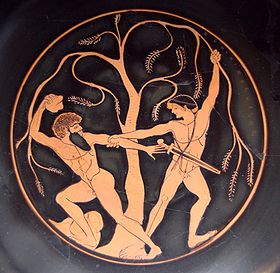.gif)
Siris (mythology)
Encyclopedia

Greek mythology
Greek mythology is the body of myths and legends belonging to the ancient Greeks, concerning their gods and heroes, the nature of the world, and the origins and significance of their own cult and ritual practices. They were a part of religion in ancient Greece...
, Sinis (Σίνις) was a bandit killed by Theseus
Theseus
For other uses, see Theseus Theseus was the mythical founder-king of Athens, son of Aethra, and fathered by Aegeus and Poseidon, both of whom Aethra had slept with in one night. Theseus was a founder-hero, like Perseus, Cadmus, or Heracles, all of whom battled and overcame foes that were...
on the road to Athens
Athens
Athens , is the capital and largest city of Greece. Athens dominates the Attica region and is one of the world's oldest cities, as its recorded history spans around 3,400 years. Classical Athens was a powerful city-state...
.
An Isthmian
Isthmus of Corinth
The Isthmus of Corinth is the narrow land bridge which connects the Peloponnese peninsula with the rest of the mainland of Greece, near the city of Corinth. The word "isthmus" comes from the Ancient Greek word for "neck" and refers to the narrowness of the land. The Isthmus was known in the ancient...
outlaw, Sinis was the son of Polypemon and Sylea. Sinis would force travelers to help him bend pine
Pine
Pines are trees in the genus Pinus ,in the family Pinaceae. They make up the monotypic subfamily Pinoideae. There are about 115 species of pine, although different authorities accept between 105 and 125 species.-Etymology:...
trees to the ground and then unexpectedly let go, catapulting the victims through the air. Alternative sources say that he tied people to two pine trees that he bent down to the ground, then let the trees go, tearing his victims apart. This led to him being called Pityocamptes (Πιτυοκάμπτης = "pine-bender").
Sinis was the second bandit to be killed by Theseus as the hero was traveling from Troezen
Troezen
Troezen is a small town and a former municipality in the northeastern Peloponnese, Greece. Since the 2011 local government reform it is part of the municipality Troizinia, of which it is a municipal unit....
to Athens, in the very same way that he had previously killed his own victims. Theseus then raped Sinis's daughter, Perigune
Perigune
In Greek mythology, Perigune was the beautiful daughter of Sinis.After Theseus killed her father, she hid herself in a bed of rushes and asparagus. Theseus was unable to find her, but it was said that she revealed herself anyway after he promised not to harm her. She later bore Theseus's first male...
, who later bore Theseus's son, Melanippus
Melanippus
In Greek mythology, there were nine people named Melanippus :#One of the sons of Agrius, killed by Diomedes.#Son of Perigune and Theseus, the father of Ioxus who, together with Ornytus, led a colony to Caria and became the ancestor of the family Ioxides.#Son of Astacus, defended Thebes in Seven...
. Perigune later married Deioneus
Deioneus
In Greek mythology, Deioneus or Deion is a name attributed to the following individuals:*Son of Aeolus, king of Phocis, and father of Cephalus, Actor, Aenetus, Phylacus, Nisus and Asterodia....
of Oechalia.
According to Pausanias, Sinis's pine was still alive and known during his times.

